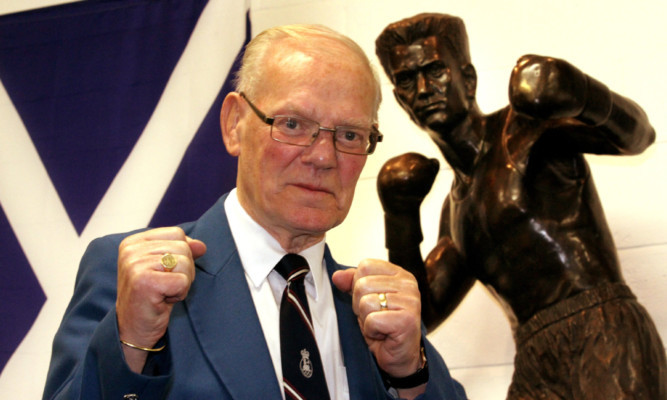There are legends, there are living legends, and then there’s Dick McTaggart.
The passage of time has not dimmed the knockout achievements of Dundee’s most successful sportsman who is regarded as the finest amateur boxer Britain has ever produced.
Fifty years after he gave up fighting, he still gets knocks at the door from neighbours asking if their kids can see his vast array of medals, and despite his advancing years, he still goes into schools to give talks.
As tales to dine out on go, he has some priceless memories. There’s the time he had dinner with Mohammed Ali at the Rome Olympics in 1960, went skinny dipping in Honolulu and turned down a party invitation from Tom Jones in Los Angeles because he was busy.
But as Dick celebrated his 80th birthday quietly at home in Troon, the down to earth Dundonian said he still “feels grateful” for every moment of his success, which was all a far cry from his early life as one of a family of 18 children raised in a Dens Road tenement in post-war austerity Dundee.
“I still get a lot of fan mail from overseas,”he told The Courier, his thick Dundee accent still audible despite almost 60 years living on the west coast.
“It all seems years ago now. But I’ve got a lot of it on tape. When I get visitors to see my medals, we sometimes watch the fights.”
Dick was the first British boxer to compete at three Olympic Games.
It was a far cry from where it all began at the former Belmont Boxing Club in the Blackness area of Dundee.
The former St Mary’s Forebank and St John’s pupil said: “My brothers and I were always fighting with each other. One day my dad said, ‘that’s it, if you want to fight you’re going to the boxing club’.
“I was 10, 11, 12 years old at the time, and I thoroughly enjoyed it. I enjoyed the shouting, the crowds, and loved to be fit in those days. Kids used to pick on me at school, and when I took up boxing they stopped.”
McTaggart left school at 14 and got a job at the former Alex Munroe butcher shop in the old Overgate.
When he was called up to do National Service in the RAF, he felt he wasn’t getting anywhere in the sport and quit for three months.
Only when an RAF coach told him he was too good to give up did he continue.
McTaggart famously went on to win 610 out of 634 amateur contests.
His first major win came with victory in the 1956 Amateur Boxing Association championships at Wembley Arena. Controversially he fought for England because Scotland didn’t select him!
It earned him selection for the Olympic Games in Melbourne later that year, winning gold in the lightweight division with a crushing victory of Harry Kurschat, the reigning European champion from Germany. McTaggart was awarded the Val Barker Trophy, as the games’ most-stylish and outstanding boxer.
Dick won a bronze medal four years later in Rome, beaten in the semi-finals by eventual gold medallist Kazimierz Pazdzior of Poland.
A gold medal was also Dick’s reward in the 1958 Commonwealth Games in Cardiff when he did fight for Scotland – with a silver his ultimate reward four years later in Perth, Australia.
He also won gold at the European Amateur Championships in Belgrade in 1961.
After his 1956 success, Dick also again won the ABA championship in 1958, 1960, 1963 and 1965.
He fought as a light welterweight at the 1964 Olympics.
He boxed well over 600 times, and his percentage of success is in the high 90s.
But despite pressure from promoters, he was never tempted to turn professional. He added:“You’ve got to be dedicated to be a professional. I loved drinking, smoking and going out with my mates. I would have had to give all that up! I don’t think I did too badly as an amateur though!”
When McTaggart “took a lot of punches” during a fight in 1965, he decided to retire. He added: “I thought, this is becoming harder. This is a mugs game. I knew that I didn’t have many brains, but I wanted to keep the ones I had!”
He went on to work for the Daily Express, became a member of the Olympic boxing squad’s coaching team and famously worked for a spell as a ‘rodent exterminator’ with Glasgow Council.
He enjoys his seaside retirement and is looking forward to renewing his wedding vows with his wife Doreen next year.
But a final boxing accolade could yet be on the horizon. It’s possible the Ex-Boxers Association might soon award him a ‘Best Amateur’ of Britain award.
He added: “It’s an honour that people still celebrate my fights. I would love to go back and do it all again. At least I can play more golf now!”
